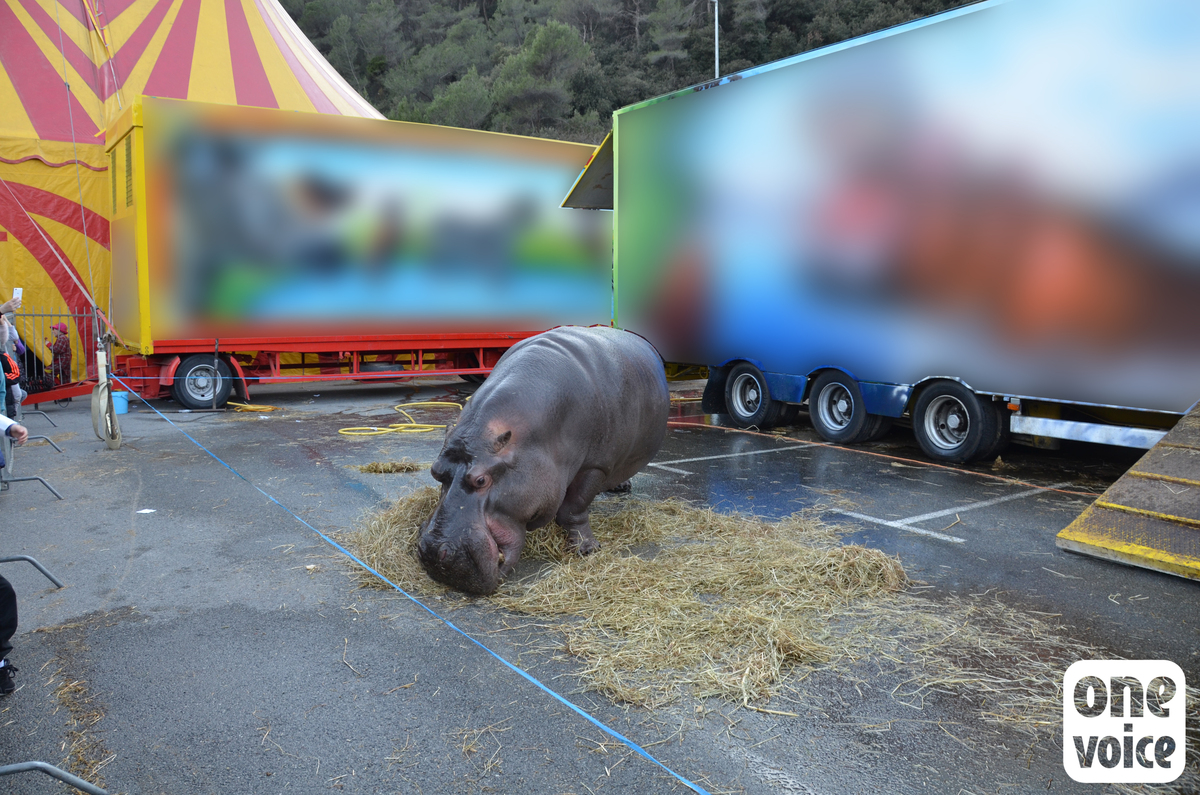

Freedom for Jumbo, a hippo prisoner of the circus!
At the last minute: the hearing is postponed until August 28 at 11:00am, the circus will present its arguments.
On August 17, seized by the association of One Voice, the judge of the summary of the Administrative Court of Grenoble will examine the case of the hippopotamus Jumbo.
For 30 years, this amphibious hippopotamus, which was made for a semi-aquatic life, is confined to a truck, deprived of any social contact with its fellow hippo’s and its natural environment, including bathing to relieve its body and joints from its own weight. It is only half an hour a day free from its trailer to be sprayed with water from a hose, malnourished and exposed to onlookers. Jumbo is being held in unacceptable and illegal conditions, especially since he does not take part in the shows.
A legal battle
Earlier in the year, One Voice’s request to cancel the opening proceedings which were rejected by the Valencia prefecture, which considered that the circus offered conditions of captivity in accordance with the regulations in force (the decree of March 18, 2011 sets conditions for the detention and use of animals in itinerant establishments). This assessment is erroneous according to One Voice, because the decree provides that animals can meet their biological and behavioural needs, and that they participate in the show. None of these criteria are met for Jumbo.
International experts mobilized
In a report issued in 1997 at the request of the Vienna Environmental Commissioner, three leading Austrian experts – Dr. Gsandter, Pechlaner and Schwammer – noted that the hippopotamus is “particularly suited for life in and around the water, to which he must have continuous access. The water point that hippopotamuses have must be deep enough for them to fully immerse themselves. Keeping them captive in pools that are too small or too shallow for too long causes joint damage. Only permanent pens can satisfy the conditions mentioned above. In addition, hippopotamuses are gregarious animals that live in groups […]. That’s why keeping hippos in captivity in circuses is totally unacceptable!”.
In March 2017, Dr. Pierre Gallego, specialist veterinarian and consultant of One Voice, made several observations of Jumbo in situ, noting that he is “fed after the show during the 30 minutes of his release. It is an extremely short time to exercise outside the trailer and to feed yourself. He is fed with hay and horse pellets, and therefore does not have access to fresh grass which is his staple food in the wild. There is no more enrichment that allows Jumbo to have a natural behaviour, even to take care of himself or to move about […] sufficiently, neither to take baths as is necessary for his species. […] In addition, the frequent transportation in trailers between the various show sites represents significant stress for this animal, which is added to the stress of being exposed to the circus visitors during the only time during which he has access to the outside of the trailer.”
For Muriel Arnal, president of One Voice, there is urgency: “We must save Jumbo! We have timed the exits to which he is entitled, he remains locked in a dark trailer 23.5 hours out of 24 without permanent access to water or participation in any performance. For an
amphibian and gregarious animal, it’s not a life! We demand respect for the physiological needs of Jumbo, as provided by law, and his release. We will ensure his transfer and his welcome into a partner sanctuary which will finally offer him dignified living conditions.”
One Voice also denounces the illegality of the 2011 decree, which allows to keep captive wild animals in circuses when precisely they cannot express their natural behaviour.
According to the association, perpetuating such exploitation also jeopardizes the work of raising awareness about the respect and protection of endangered species.
The circus of yesteryear, which heavily exploits animals for unnatural shows, is in decline. Many mayors of France refuse that such companies deploy their marquee in the communal territory, unlike modern troops, offering attractions without cruelty. In large countries (United States, India, Australia, Brazil …), total or partial bans (depending on the species) have been enacted. In the European Union, 20 member countries have already taken similar measures. One Voice is fighting for France to be 21st.